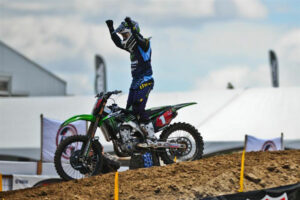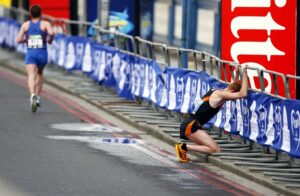Imagine dedicating your life to a sport and climbing to the very pinicle of it, only to be sidelined by an unexplained fatigue that no amount of training or willpower can overcome. This is the harsh reality for many endurance athletes. This article will break down the debilitating conditions that cause such fatigue, including Epstein-Barr Virus (EBV), Chronic Fatigue Syndrome (CFS), and mononucleosis (mono).
We’ll discuss the causes and symptoms of these conditions and their profound effects on athletes’ careers. By highlighting the experiences of notable athletes like motocross legends Ricky Carmichael and Chad Reed, who have faced these challenges head-on, we’ll see the resilience required to navigate these health issues and understand the importance of proper management and support.
What is Epstein-Barr Virus?
A Brief Overview
Epstein-Barr Virus (EBV) is a member of the herpesvirus family and one of the most common human viruses. It’s best known for causing infectious mononucleosis, also known as “mono” or the “kissing disease.” EBV is highly contagious and spreads through bodily fluids, primarily saliva, but can also be transmitted through blood and semen during sexual contact, blood transfusions, and organ transplants.
Symptoms and Diagnosis
EBV infections can present with a variety of symptoms, including:
- Fever
- Sore throat
- Swollen lymph nodes
- Fatigue
- Muscle aches
Most people are infected with EBV at some point in their lives, often during childhood or adolescence. The initial infection can range from mild to severe. While many recover fully, EBV can remain dormant in the body and reactivate later, sometimes leading to chronic conditions.
Diagnosis typically involves blood tests to detect antibodies against the virus. In cases of suspected chronic EBV, additional tests may be needed to rule out other potential causes of symptoms.
EBV in the Context of Motocross and Endurance Sports
The Physical Demands of Motocross
Motocross is one of the most physically demanding sports, requiring high levels of endurance, strength, and mental toughness. Riders must maintain control over powerful bikes while navigating rough terrains at high speeds. This intense physical activity puts significant strain on the body, making athletes more susceptible to infections and illnesses.
The Prevalence of EBV Among Athletes
EBV has become a notable concern in motocross and other endurance sports. Athletes often push their bodies to the limit, leading to weakened immune systems and increased vulnerability to infections. The physical and mental stress of intense training and competition can reactivate dormant EBV, resulting in symptoms that hinder performance and recovery.
Chad Reed’s Struggle with EBV
Chad Reed, a prominent motocross racer, publicly shared his battle with EBV in 2010. Despite his rigorous training and preparation, Reed found himself unable to perform at his usual level, plagued by unexplained fatigue and underperformance. After numerous medical consultations, he was diagnosed with EBV. Reed’s experience underscores the challenges that athletes face when dealing with this virus, as chronic fatigue can severely impact their ability to compete.
In Reed’s own words:
“I have spent most of the last month in and out of my doctor’s office getting tests done, trying to figure out what is going on. Each weekend I head to the race excited to get out there and get some wins on my Monster Energy Kawasaki, ready to defend the number 1 plate that is on my bike, knowing that I have worked hard during the week, on and off the bike. The team and bike are prepped and ready on race day and then I’m unable to race like I normally can. Where is that fight that I normally have?”
The Evolution of Fitness in Motocross
Ricky Carmichael: Raising the Bar
Motocross has always been physically demanding, but the bar was significantly raised by Ricky Carmichael, often referred to as “The GOAT” (Greatest of All Time). Before Carmichael, training was intense but not nearly as rigorous as it became during his era. Carmichael’s dedication to fitness and relentless training regimen set new standards in the sport. He dominated the motocross world, winning numerous championships and retiring at the age of 27 as one of the sport’s greatest athletes.
However, this intense training came at a cost. By the time he retired, Carmichael’s body had begun to break down from the massive strain of his regimen. His commitment to fitness led to a decade where every racer had to push their training to the limit to stay competitive.
The Ripple Effect: Chad Reed and Beyond

Following Carmichael’s lead, motocross racers like Chad Reed had to
elevate their training to compete. Reed, in his quest to challenge Carmichael, adopted similarly intense training practices. Unfortunately, this relentless pursuit of excellence often led to health issues, as seen in Reed’s struggles with his fitness in the 2010 Outdoor Pro Motocross Series.
Reed publicly shared his battle with Epstein-Barr Virus (EBV) in 2010, a condition that severely affected his performance. Despite his rigorous preparation, he found himself unable to perform at his usual level, plagued by unexplained fatigue and underperformance. Reed’s experience underscores the challenges that athletes face when dealing with chronic fatigue and related illnesses.
The Impact of EBV on Athletic Performance
Fatigue and Endurance
One of the most debilitating symptoms of EBV is extreme fatigue. This goes beyond regular tiredness and can severely impact an athlete’s ability to train and compete. Endurance sports require sustained physical effort, and chronic fatigue can make it nearly impossible to perform at a high level.
Immune System Dysfunction
EBV can weaken the immune system, making athletes more susceptible to other infections and illnesses. This creates a vicious cycle where the body struggles to recover fully, leading to prolonged periods of underperformance and health issues.
Mental Health and Motivation
The psychological impact of dealing with a chronic illness like EBV cannot be understated. Athletes may experience frustration, depression, and anxiety as they struggle to manage their symptoms and maintain their careers. This mental health burden can further hinder performance and recovery.

(CFS) in Endurance Athletes
Understanding Chronic Fatigue Syndrome
Chronic Fatigue Syndrome (CFS) is a complex disorder characterized by extreme fatigue that doesn’t improve with rest and may worsen with physical or mental activity. The exact cause of CFS is unknown, but it can be triggered by various factors, including viral infections, immune system problems, and hormonal imbalances.
Symptoms of CFS
- Persistent fatigue
- Loss of memory or concentration
- Sore throat
- Enlarged lymph nodes in the neck or armpits
- Unexplained muscle or joint pain
- Headaches
- Unrefreshing sleep
- Extreme exhaustion after physical or mental exercise
Ricky Carmichael and CFS
Ricky Carmichael, often referred to as “The GOAT” (Greatest of All Time) in motocross, has faced significant health challenges throughout his career. While Carmichael has not publicly disclosed an EBV diagnosis, there is speculation that he may have dealt with Chronic Fatigue Syndrome (CFS). His intense training regimen and relentless competition schedule likely contributed to his condition. Carmichael’s experience highlights the physical and mental toll that such demanding sports can take on athletes.
Mononucleosis in Athletes
What is Mononucleosis?
Mononucleosis, commonly known as mono, is an infectious disease usually caused by the Epstein-Barr Virus (EBV). Mono is prevalent among teenagers and young adults as it has been known as the “kissing virus”, but athletes are particularly vulnerable due to their rigorous training programs.
Symptoms of Mononucleosis
- Fever
- Sore throat
- Swollen lymph nodes
- Fatigue
- Swollen tonsils
- Headache
- Skin rash
- Soft, swollen spleen
The Impact of Mono on Athletic Performance
Athletes diagnosed with mono must take significant time off from training and competition to recover fully. The intense fatigue and other symptoms can last for weeks or even months, severely affecting an athlete’s performance and career progression.
The Role of Adrenal Fatigue and Hormone Disruption
Understanding Adrenal Fatigue
Adrenal fatigue is a term used to describe a condition where the adrenal glands, which produce hormones such as cortisol, become overworked due to chronic stress. While not officially recognized as a medical diagnosis, many athletes report symptoms consistent with adrenal fatigue, including:
- Persistent tiredness
- Difficulty getting up in the morning
- Cravings for salty or sweet foods
- Reliance on stimulants like caffeine
Intense Training and Hormone Disruption
Endurance athletes, including motocross racers, often engage in rigorous training schedules with little to no off-season. This relentless physical exertion can lead to hormonal imbalances, particularly involving cortisol, testosterone, and thyroid hormones. These imbalances can result in symptoms like:
- Decreased performance
- Slower recovery times
- Mood swings
- Sleep disturbances
The Insights of Ryan Hughes
Motocross legend Ryan Hughes has highlighted how modern advancements in bike technology have allowed riders to focus more on technique and skill building rather than intense year-round training. Hughes noted that the improved performance of bikes has provided an opportunity for racers to tone down their grueling training schedules, which can help mitigate the risk of overtraining and associated health issues like EBV and CFS.
However, historically, the sport has demanded continuous high-intensity training, ranking motocross among the most physically demanding sports. The minimal off-season for these racers leaves them particularly susceptible to fatigue-related illnesses due to the constant physical and mental strain.
Examples of Notable Athletes Affected by Fatigue Diseases
Examples of Notable Athletes Affected by Fatigue Diseases
Lance Armstrong
Lance Armstrong, the renowned cyclist, faced numerous health challenges throughout his career, including a battle with testicular cancer. While his public struggle with cancer is well-known, he has also spoken about the severe fatigue that accompanied his treatments and recovery. The physical and mental toll of his illness and the rigorous demands of professional cycling required a remarkable level of resilience and endurance. More on Armstrong’s experiences can be found in this interview with ESPN.
Paula Radcliffe
Paula Radcliffe, a world-record-holding marathon runner, has experienced severe fatigue due to various health issues. In 2004, Radcliffe withdrew from the Olympic marathon, later revealing that she had been battling a leg injury and stomach issues that left her severely fatigued. Her experience highlights the impact that health problems can have on even the most elite endurance athletes. Read more about Radcliffe’s story on BBC Sport.
Ian Thorpe
Ian Thorpe, an Australian swimmer and multiple Olympic gold medalist, has dealt with chronic fatigue and depression throughout his career. Thorpe’s struggles with fatigue led to periods of absence from competition and significantly impacted his training and performance. His openness about his mental and physical health challenges has shed light on the pressures faced by elite swimmers. Details about Thorpe’s journey can be found in this ABC News article.
Tim Don
Tim Don, a professional triathlete and Ironman world record holder, suffered from extreme fatigue following a severe neck injury in 2017. His recovery process was long and arduous, involving intensive rehabilitation and careful management of his energy levels. Don’s determination to return to competition despite his health challenges exemplifies the resilience required to overcome such obstacles. More on Don’s recovery can be read in this Triathlete Magazine article.
Kristin Armstrong
Kristin Armstrong, a celebrated American cyclist and three-time Olympic gold medalist, has faced her share of health issues, including overtraining and fatigue. Armstrong has spoken about the importance of listening to her body and balancing intense training with adequate rest. Her experiences underscore the necessity of managing health and recovery in endurance sports. Further insights can be found in this NBC Olympics feature.
Coping Strategies and Management
For endurance athletes, finding the right balance between intense training and optimal recovery is crucial. It’s not just about pushing hard; it’s equally important to incorporate strategies that promote holistic health and longevity in their careers. Here are key areas to focus on:
Rest and Recovery
Adequate rest is essential for athletes dealing with fatigue illnesses. This means embracing the concept of balancing yin (rest) with yang (activity). Physical rest, combined with mental relaxation techniques such as meditation and mindfulness, helps reduce stress levels and allows the body to heal. Prioritizing quality sleep and taking breaks from intense training can significantly enhance recovery and prevent overtraining.
Nutrition and Hydration
Fueling the body with a balanced diet rich in vitamins and minerals supports immune function and overall health. Staying hydrated is equally important, as dehydration can exacerbate symptoms of fatigue. Athletes should focus on consuming whole foods and avoiding processed items to maintain energy levels and promote recovery. Some may also benefit from specific supplements, such as vitamin C and zinc, to support their immune system.
Holistic Health Practices
Incorporating holistic health practices can provide a sustainable approach to managing fatigue illnesses. Techniques like yoga, tai chi, and qi gong offer gentle ways to keep the body active while promoting relaxation and mental clarity. These practices help maintain a healthy balance between training and recovery, reducing the risk of burnout and chronic fatigue.
Working with Holistic Health Coaches and Specialists
Partnering with the right holistic health coaches and specialists can make a significant difference in an athlete’s career longevity and overall well-being. Integrating consistent protocols such as IV treatments, red light therapy, oxygen therapy, and ozone therapy can support recovery and enhance performance. These therapies can help manage symptoms, boost immune function, and improve overall energy levels, allowing athletes to maintain peak performance and prolong their careers.
Checkered Flag: Navigating the Challenge of Fatigue Diseases in Endurance Sports
Fatigue diseases like Epstein-Barr Virus, Chronic Fatigue Syndrome, and mononucleosis present significant challenges for athletes, particularly in demanding sports like motocross. Understanding these conditions, their symptoms and their impact on performance is crucial for athletes, coaches, and medical professionals. By prioritizing rest, nutrition, and medical support, athletes can manage their symptoms and continue to perform at high levels.







